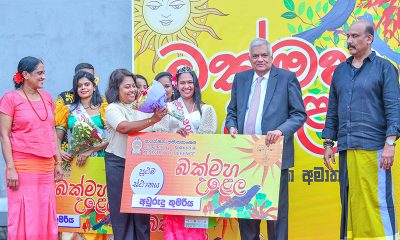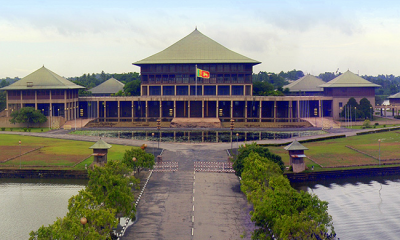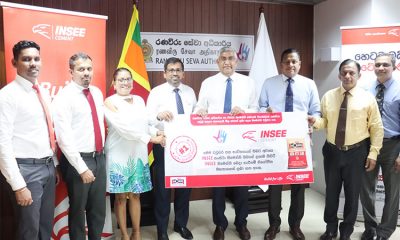Business
IOM Sri Lanka and Ministry of Defence in collaboration with Sri Lankan Airlines conduct programme on responding to human trafficking
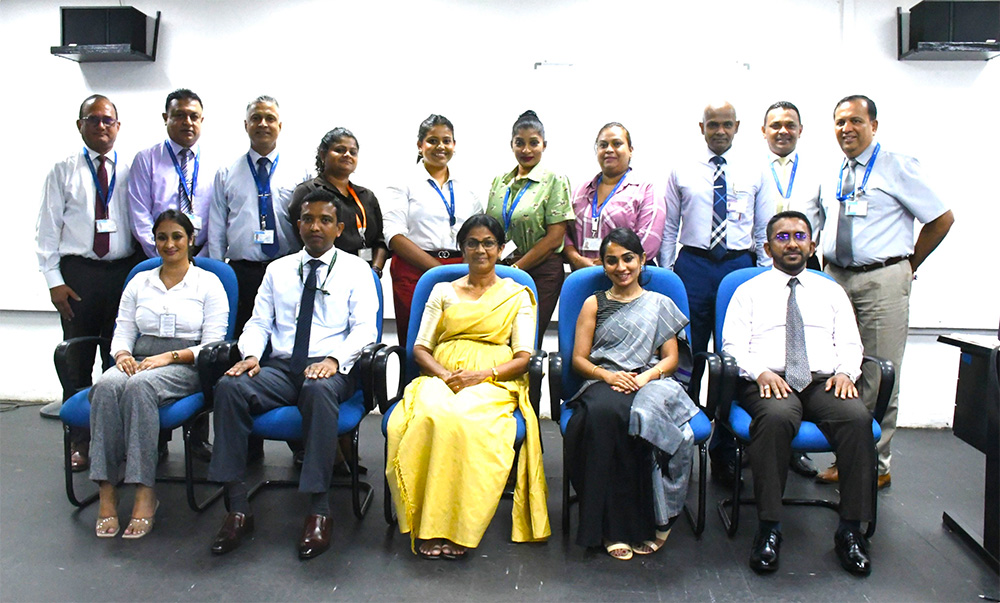
Aviation is the most frequent and quickest way to transport victims of human trafficking across borders. To combat this heinous crime, it’s crucial for airlines, law enforcement agencies to collaborate, implement efficient measures and train staff to recognize signs of human trafficking, and raise awareness among the stakeholders as they play an important role in effectively identifying, preventing, and responding to human trafficking.
International Organisation for Migration (IOM) Sri Lanka and the Ministry of Defence (As the Chair of the National Anti-Human Trafficking Task Force – Sri Lanka) in collaboration with Sri Lankan Airlines, recently conducted a programme for the trainers of Sri Lankan Airlines on human trafficking with a special focus on the role and responsibilities of Airlines in identifying, reporting, and effectively responding to incidents of trafficking.
The participants were capacitated with the knowledge, analytical methods and resources that can be utilized to effectively identify victims of human trafficking and report such incidents. They also shared valuable insights and interesting encounters of successful identification of victims of trafficking.
“The aviation industry is in a unique position to identify and report trafficking cases, if airline staff are sufficiently equipped with the required skills. Strengthening counter trafficking measures in Sri Lanka and creating a unified front against trafficking are vital to combat the issue and we are happy to have played a pivotal role in providing technical support to the Ministry of Justice, Ministry of Defence, and the National Anti-Human Trafficking Task Force since 2010” stated Sarat Dash, IOM Chief of Mission for Sri Lanka.
The training covered prevention aspects, the effective identification and reporting of potential trafficking incidents and protection to victims. The sessions were delivered by the thematic experts from the Ministry of Defence, IOM, and the National Child Protection Authority (NCPA).
The training also incorporated the International Civil Aviation Organisation (ICAO) – Office of the High Commissioner for Human Rights (OHCHR) Guidelines for Training Cabin Crew on Identifying and Responding to Trafficking in Persons (ICAO Circular 352) and Guidelines for Reporting Trafficking in Persons by Flight and Cabin Crew (ICAO Circular 357). (IOM)
Business
Vehicle permit revival threatens governance credibility – Advocata

Advocata warns revival of vehicle permits threatens governance credibility, public trust and economic reform and strongly cautions against government consideration to allow vehicle imports for high-ranking government officials who received permits upon retirement.
According to statements in Parliament, 1,900 permits have already been issued under this concessional scheme for senior officials, with 563 permits issued in 2025 alone. Meanwhile, ordinary citizens endure an extended vehicle import ban and some of the highest effective taxes on personal transport vehicles in the world.
During the presentation of the 2026 Budget Proposal, President Anura Kumara Dissanayake declared: “There will be no permits. The permit culture must end in Sri Lanka!”
Advocata welcomed this commitment, recognising permit culture as a relic of a feudal system, not a feature of a modern economy. It is a system that has, for decades, rewarded privilege over performance, entrenched inequality, and undermined the credibility of the state. The President’s affirmation offered renewed hope that Sri Lanka was finally moving toward transparent and equitable reform.
To now entertain exemptions for a select group sends a dangerous signal about reform credibility. Even policies publicly acknowledged as corrosive have the potential to quietly return.
The Normalisation of State Sanctioned Privilege
Vehicle permits are not compensation. They are discretionary privileges, operating as hidden transfers of public wealth to a privileged few, while the broader population absorbs higher taxes and reduced services. Worse still, they place retirement benefits at the mercy of political discretion, turning professional civil servants into political dependents rather than accountable public servants.
Therefore, it is precisely the high-ranking officials that must lead by example.
In December 2010, Transparency International Sri Lanka revealed that the majority of 65 newly elected Parliamentarians, including 2 Cabinet Ministers, sold their duty free vehicle permits for as much as Rs. 17 million each, when adjusted for inflation using Department of Census and Statistics figures, that windfall is equivalent to which adjusted for inflation sits at approximately Rs. 48 million today.
In December 2012, in an event the Sunday Times classified as a “Christmas Bonanza for MPs,” the Government granted permission for MPs to openly sell their duty free permits. At the time, they sold for Rs. 20 million each, which adjusted for inflation sits at approximately Rs. 50 million today.
In October 2016, Nagananda Kodituwakku, an attorney-at-law and rights activist, wrote to the Commissioner General of Motor Traffic, naming 75 MPs who imported luxury vehicles, including BMWs, Mercedes-Benz, Land Cruisers and even a Hummer. The total tax waived per MP ranged from Rs.30 million to Rs. 44.7 million. In today’s terms, this range approximately translates to between a staggering Rs. 66 million and Rs. 98.5 million.
History demonstrates the scale of abuse enabled by this system.
Toward integrity in Governance
As Advocata has previously highlighted, Sri Lanka’s cascading tax structure drives effective import duties on most passenger vehicles into the 125–250 percent range. Every duty-free permit therefore represents a direct fiscal loss; revenue that must be recovered through higher taxes elsewhere or reduced public services for everyone else. Since 2020 alone, more than 25,000 duty-free permits have been issued to government employees, including during the height of the economic crisis.
Making exceptions now would set a dangerous precedent. It signals to every remaining permit holder that persistence will be rewarded, inevitably triggering lobbying pressure and further demands for carveouts. This is how temporary “concessions” become permanent entitlements. Once reopened, the system cannot be credibly contained.
From an economic and governance perspective, reintroducing selective exemptions would undermine public confidence in fiscal consolidation, weaken the credibility of reform commitments, and damage investor perceptions of Sri Lankan regulatory stability and policy consistency.
The appropriate solution lies in transparent, on-budget salary structures, subject to Parliamentary oversight. Crucially, they must compensate public servants fairly without undermining fiscal discipline or institutional integrity, avoiding the distortions created by discretionary privilege schemes.
Advocata calls on the government to take the following actions:
Abandon plans to allow vehicle imports under existing duty free permits.
Commit to permanently ending vehicle permit schemes, replacing them with clear and transparent salary frameworks subject to Parliamentary oversight.
Legislate a prohibition on duty-free vehicle permits for public sector officials, safeguarding against future reversals and ensuring consistent policy application.
Sri Lanka cannot rebuild trust while preserving elite carve-outs. Reform commitments retain credibility only when they are applied consistently — without selective exemptions. Advocata spokespersons are available for live and pre-recorded broadcast interviews via 0755477522
Business
Sri Lanka gears up for global cycling adventure
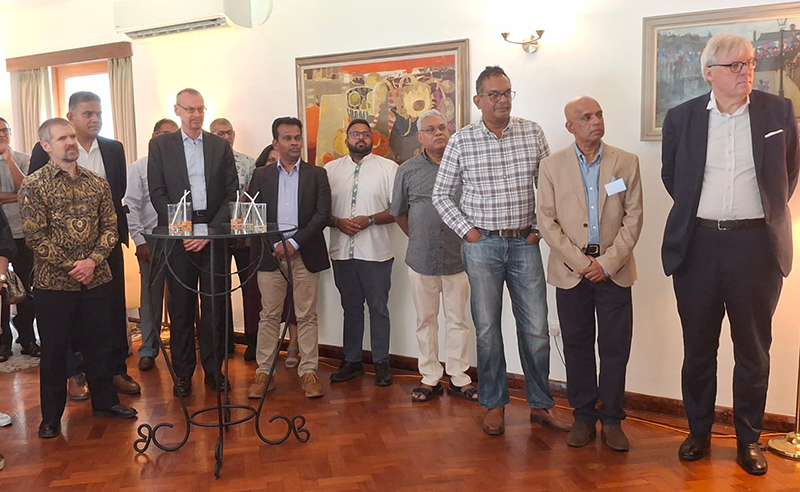
The vibrant island of Sri Lanka is set to welcome cycling enthusiasts from around the globe with the much-anticipated Trek4 Sri Lanka Cycle Ride, an event that promises adventure, breathtaking views, and a celebration of local culture.
Trek4 Ceylon officially announced its annual tour of Sri Lanka at a press conference held at Cinnamon Grand Colombo, unveiling the 2026 five day charity ride dedicated to restoring St. Luke’s Methodist Mission Hospital in Puttur. The trek began from Cinnamon Grand Colombo February 10th and will end in Jaffna on 14th February covering over 560 kilometers across Sri Lanka. The ride will cover some of the most picturesque routes across the island, from the stunning beaches up to Jaffna. Over 50 riders from 11 countries take part in the trek including United Kingdom, Australia and United States of America.
Andrew Patrick, British High Commissioner to Sri Lanka expressed strong support for the Trek4 initiative. He stated, “This cycle trek not only promotes cycling and sustainable tourism but also emphasizes our mission to help local communities thrive. By participating in this event, cyclists will contribute directly to the local economy and foster community development. It’s a fantastic opportunity to explore the beauty of Sri Lanka while making a positive impact.”
Speaking at the gathering Australian High Commissioner Matthew Duckworth said “Cycling in Australia is a deeply ingrained cultural phenomenon, with Australians being world-renowned for their participation in both competitive road cycling and extensive off-road trekking. It was an honor to attend the send-off gathering for the Trek4 cycle ride in Sri Lanka at Westminster House. This initiative not only promotes fitness and camaraderie but also strengthens the bonds between our nations. I am excited to see the positive impact it will have on both participants and the communities they engage with along the way. “
By Claude Gunasekera
Business
Anticipated uptick in banking and financial sector shares

Both CSE indices showed high performance yesterday because most stock investors anticipate an upwards trend in the banking and financial sector in the coming months, market analysts said.Amid those developments both indices moved upwards with a high turnover level. The All Share Price Index went up by 37.33 points, while the S and P SL20 rose by 24.17 points.
Turnover stood at Rs 8.5 billion with 17 crossings. Top seven crossings were as follows: Tokyo Cement 11.5 million shares crossed to the tune of Rs 1.19 billion; its shares traded at Rs 104, TJ Lanka 18 million shares crossed for Rs 671 million; its shares traded at Rs 37.50, Sampath Bank 2.35 million shares crossed for Rs 366 million; its shares sold at Rs 156, Tokyo Cement 1.95 million shares crossed for Rs 168 million; its shares sold at Rs 86.20, Colombo Dockyards 1 million shares crossed for Rs 156 million; its shares traded at Rs 156 and HNB 313,000 shares crossed for Rs 136.8 million; its shares sold at Rs 437 and Digital Mobility Solutions 500,000 shares crossed for Rs 79.5 million; its shares traded at Rs 159.
In the retail market, top seven companies that mainly contributed to the turnover were; Tokyo Cement Rs 866 million (8.3 million shares traded), Tokyo Cement (Non-Voting) Rs 746 million (8.6 million shares traded), Colombo Dockyard Rs 410 million (2.6 million shares traded), TJ Lanka Rs Rs 331 million (8.9 million shares traded), Softlogic Capital Rs 305 million (40 million shares traded), Janashakthi Insurance Rs 227 million (1.5 million shares traded) and HNB Rs 152 million (350,000 shares traded). During the day 57.32 million shares volumes changed hands in 36500 transactions.
It is said that construction related companies, especially Tokyo Cement, performed well while the banking and financial sector performed well too, especially Sampath Bank and HNB.
Yesterday the rupee was quoted at Rs 309.20/23 to the US dollar in the spot market, from Rs 309.30/37 the previous day, dealers said, while bond yields were broadly steady.
By Hiran H Senewiratne
-

 Features7 days ago
Features7 days agoMy experience in turning around the Merchant Bank of Sri Lanka (MBSL) – Episode 3
-

 Business7 days ago
Business7 days agoRemotely conducted Business Forum in Paris attracts reputed French companies
-

 Business7 days ago
Business7 days agoFour runs, a thousand dreams: How a small-town school bowled its way into the record books
-

 Business7 days ago
Business7 days agoComBank and Hayleys Mobility redefine sustainable mobility with flexible leasing solutions
-

 Business4 days ago
Business4 days agoAutodoc 360 relocates to reinforce commitment to premium auto care
-

 Midweek Review4 days ago
Midweek Review4 days agoA question of national pride
-

 Opinion3 days ago
Opinion3 days agoWill computers ever be intelligent?
-

 Midweek Review4 days ago
Midweek Review4 days agoTheatre and Anthropocentrism in the age of Climate Emergency


